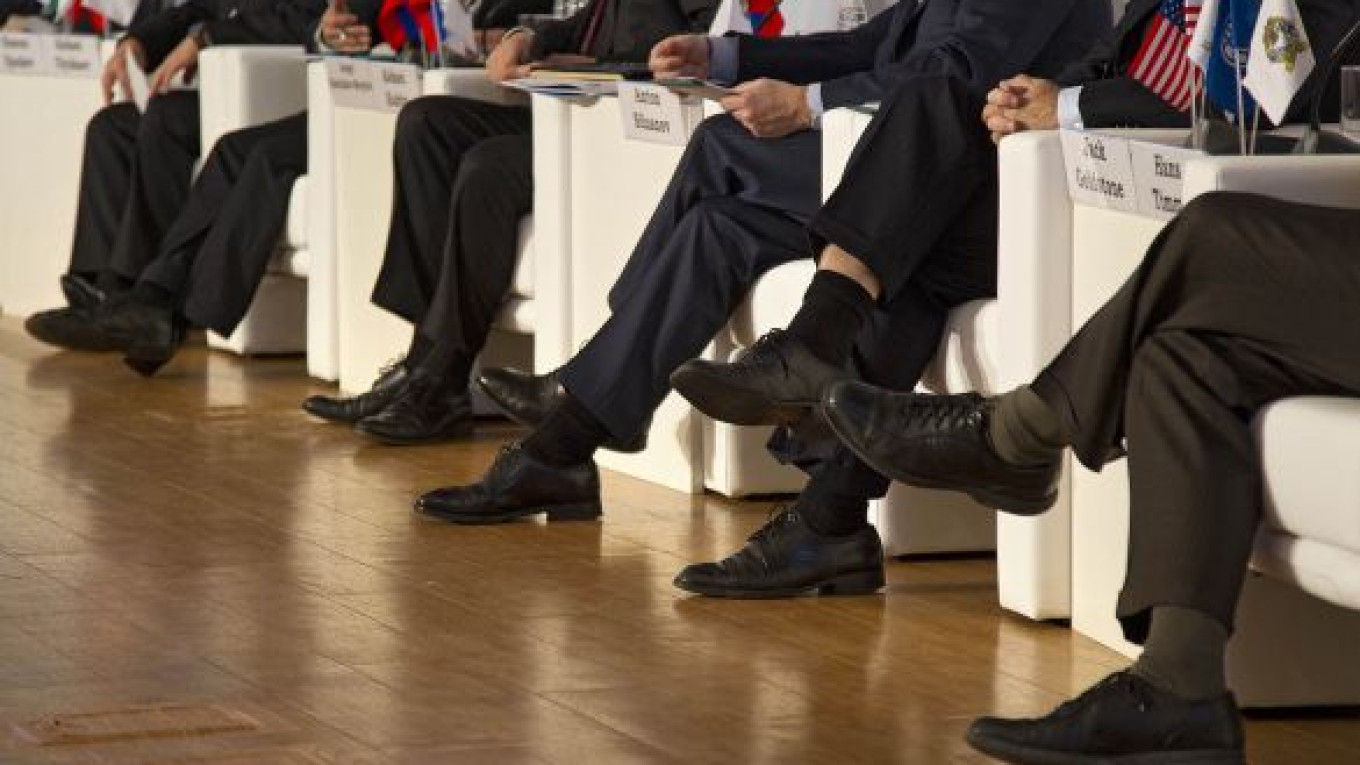Prime Minister Dmitry Medvedev on Wednesday urged the Cabinet to ensure stable economic growth of at least 5 percent a year in the near future, a goal some officials said might require changes to current budget policy.
The major goal for the country's government is "to ensure transition to the path of sustainable economic growth of at least 5 percent," Medvedev said at an economic forum in Moscow. "We must have this purpose in mind and, based on that, attain stable growth of Russian citizens' wealth," he said.
Medvedev, who was speaking in a crowded hall full of international economic experts and government officials, outlined a number of measures he said are critical for ensuring macroeconomic stability.
Among other things, he called for stimulating private investment, developing small and medium-sized businesses and delivering on the plans to privatize state assets.
The announcement came as President Vladimir Putin was assessing Russia's economic performance in 2012, calling the preliminary results "satisfactory."
Gross domestic product increased 3.5 percent between January and November, while unemployment remained as low as 5.4 percent, Putin said at a meeting with bankers and Kremlin officials, citing data provided by the Economic Development Ministry.
He added that inflation also remained relatively low last year and resulted primarily from the increase in food prices.
According to the Central Bank, inflation reached 6.8 percent last year. The regulator hopes that the annual inflation target of 5 to 6 percent will become realistic starting in the second quarter of this year, the bank's first deputy chairman, Alexei Ulyukayev, said at the forum.
However, Putin said it's too early for officials to relax, as the volatility of? the country's key macroeconomic indicators throughout 2012 "causes concerns."
"According to the estimates by the Economic Development Ministry, annual GDP growth is slowing down. … Manufacturing and investment are demonstrating a similarly flagging dynamic. There are some problems in agriculture as well," he said, according to the Kremlin website.?
The Economic Development Ministry sounded optimistic about the prospects of Russia's economic growth, with Deputy Minister Andrei Klepach saying that Russia's economy has the potential to show more impressive growth rates.
"We fall short of our growth potential," he told reporters on the sidelines of the forum.
But he warned that achieving the goal of 5 percent growth might require drastic changes to the existing budget policy.
"We can speed up the growth rates and attain GDP growth of … over 4 percent a year. But this requires serious changes, including, in my opinion, correction of the budget rule," Klepach said.
To ensure macroeconomic stability, Russia has adopted a policy that ties public spending to oil prices. For this year, the government planned the budget based on the expected oil price of $91 per barrel.
Given the current situation, the economy is unlikely to grow more than 4 percent per year, while a 5 percent increase is possible only if serious structural reforms are carried out across a number of industries, said former Finance Minister Alexei Kudrin.
"Some steps that have been recently taken don't allow us to say that such a trend can arise," he said on the sidelines of the forum, referring to the reforms, Prime reported.
Meanwhile, Medvedev called for the government to deliver on its promises to reduce its involvement in the economy to help make businesses more competitive and ensure economic stability.
Authorities shouldn't postpone privatization until market conditions improve because implementing the plan is essential for? increasing the economy's competitiveness, he said.
"Of course assets should be sold in favorable market conditions, but we can't wait for them forever, otherwise we'll never sell anything," he said.
Related articles:
A Message from The Moscow Times:
Dear readers,
We are facing unprecedented challenges. Russia's Prosecutor General's Office has designated The Moscow Times as an "undesirable" organization, criminalizing our work and putting our staff at risk of prosecution. This follows our earlier unjust labeling as a "foreign agent."
These actions are direct attempts to silence independent journalism in Russia. The authorities claim our work "discredits the decisions of the Russian leadership." We see things differently: we strive to provide accurate, unbiased reporting on Russia.
We, the journalists of The Moscow Times, refuse to be silenced. But to continue our work, we need your help.
Your support, no matter how small, makes a world of difference. If you can, please support us monthly starting from just $2. It's quick to set up, and every contribution makes a significant impact.
By supporting The Moscow Times, you're defending open, independent journalism in the face of repression. Thank you for standing with us.
Remind me later.


